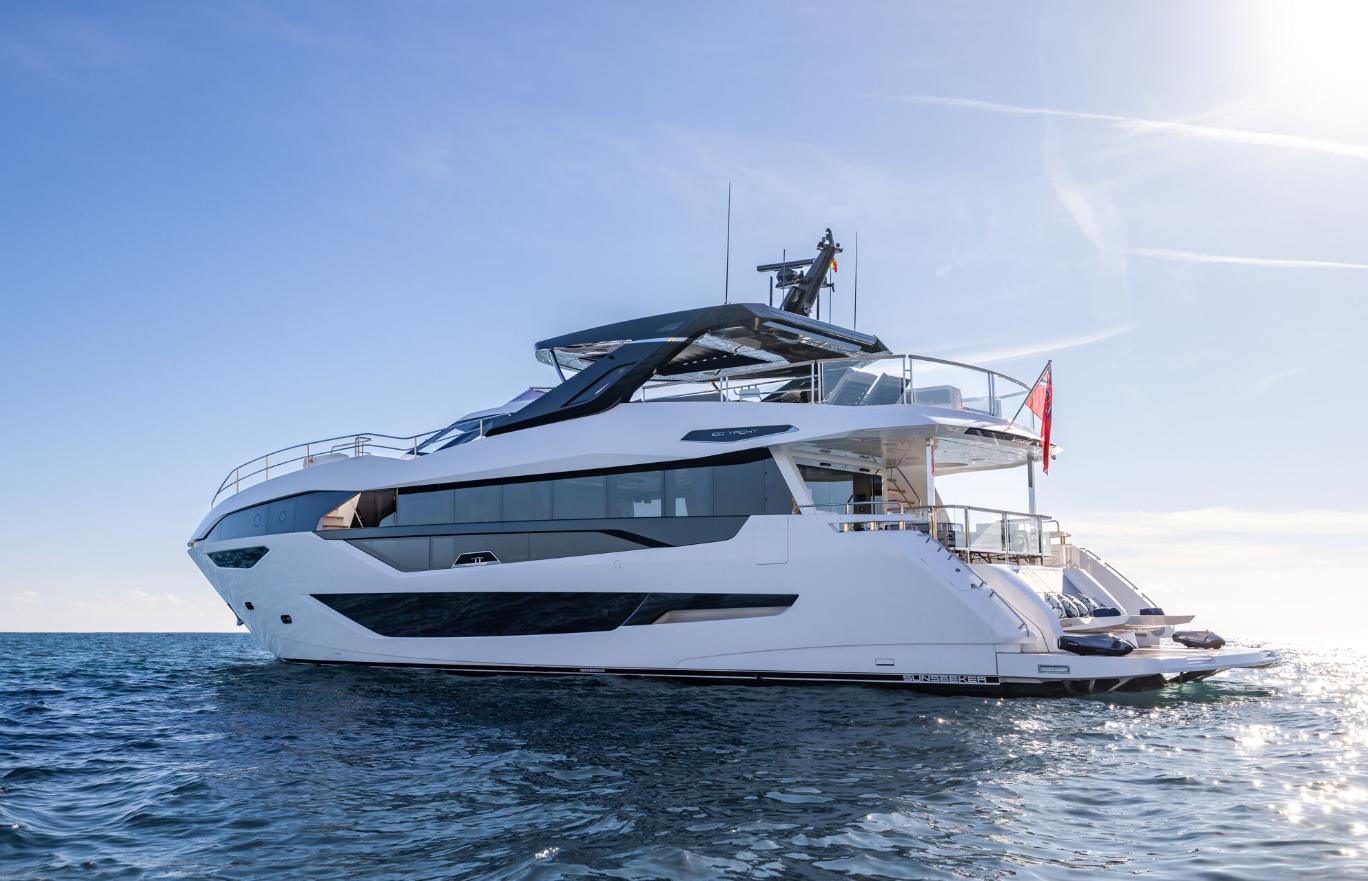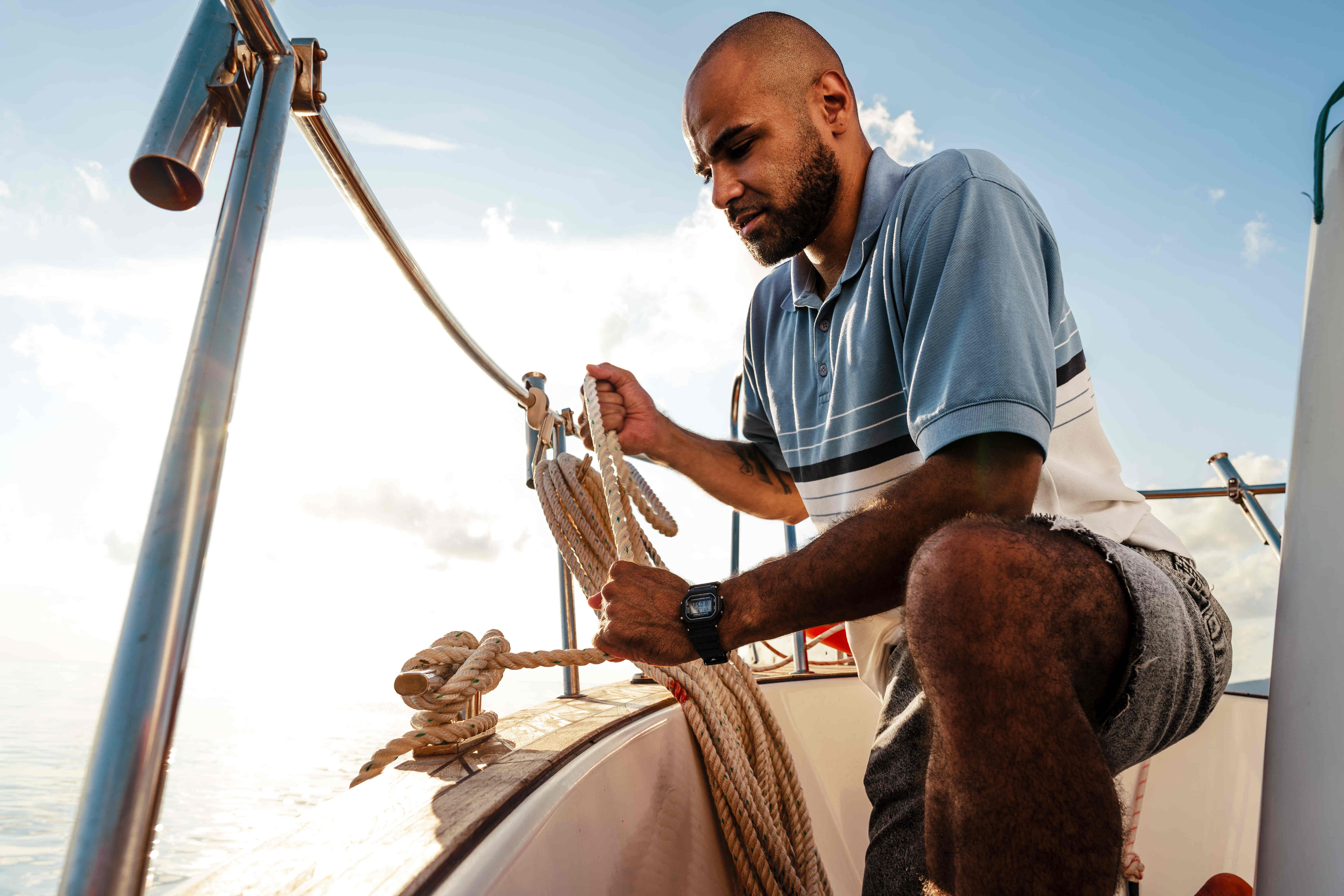7 Tips for Buying a New Yacht: What Every Owner Should Know in 2025

Buying a new yacht is not simply a purchase; it’s a decision that shapes your lifestyle for years to come. In 2025, yachts are more advanced, luxurious, and personalized than ever, making it the perfect time to step into ownership. With so many options available, it can be overwhelming to know where to start, which is why having the right tips for buying a new yacht can make all the difference, guiding you with care, clarity, and the support of trusted experts.
At DCH Marine, we know our clients are not just buying a vessel. They are investing in a vision of freedom, leisure, and prestige. With decades of experience and a carefully selected portfolio of luxury motor yachts, we guide owners through every step of the journey, ensuring they not only choose the right yacht but also enjoy the experience of ownership from day one.
Below, we share seven essential tips for buying a new yacht in 2025, alongside how DCH Marine makes each step effortless, secure, and tailored to you. So, let’s get into the details.
1. Know How You Plan to Use the Yacht
Every great yacht purchase begins with one important question: What do I want my yacht to do for me? Some clients imagine weekends spent at anchor with their families, others dream of hosting glamorous evening gatherings on deck, while many are drawn to the idea of setting off on long-range adventures across open waters.
The way you plan to use your yacht should guide every decision that follows, from the layout and features to the level of crew support you’ll require. For example, families often value extra cabins and practical safety features, while those who love entertaining look for expansive social spaces like flybridges and lounges. Long-distance cruisers, on the other hand, tend to prioritize fuel efficiency, range, and onboard comfort.
At DCH Marine, these are the very questions we explore in our first conversations with clients. Because we specialize in luxury motor yachts, we are able to present you with options that perfectly align with your intended lifestyle, ensuring your yacht is not just a vessel but an extension of how you choose to live.
So, once you know what kind of adventures await, the next step is just as crucial: can you afford them?
2. Set a Clear Budget
Buying a yacht means more than just paying the purchase price. There are several ongoing costs that you’ll need to account for to avoid financial stress down the line.
Here’s what you should factor into your budget:
- Maintenance and repairs – Regular upkeep, engine servicing, and unexpected fixes.
- Insurance – Premiums vary based on the yacht’s value, usage, and location.
- Docking and storage – Marina fees, seasonal storage, and haul-outs.
- Fuel – Especially important for motor yachts or long cruising trips.
- Crew – If your yacht needs a captain or support crew, include their salaries and benefits.
- Licensing and registration – Country-specific fees and taxes.
- Upgrades or equipment – Electronics, safety gear, water toys, or navigation tools.
Also, set aside an emergency buffer, around 10%–15% of the yacht’s value is a safe cushion. Yachts often have hidden or unexpected costs, especially in the first year of ownership.
One of the advantages of working with DCH Marine is that we don’t just sell you a yacht and step away. Our consultants help you build a realistic picture of ownership, so you understand both the pleasures and responsibilities that come with it.
By walking you through projected costs and helping you plan ahead, we ensure that your investment remains a source of joy, not stress. Many of our clients find comfort in the fact that they can lean on our after-sales service for regular maintenance, insurance support, and bespoke care packages.
Nevertheless, with your finances mapped out, it’s time to tackle the big decision, literally: how big should your yacht be?
3. Pick the Right Size and Type
Choosing the right size and style is one of the most important decisions you’ll make. It’s not just about how big the yacht is, it’s about how you plan to use it, where you’ll cruise, how many guests you’ll host, and what kind of onboard lifestyle you want.
Why Size Matters, More Than Just Length
Larger yachts offer space, comfort, and status, multiple decks, generous interior volume, room for crew, and amenities like beach clubs or large flybridges. But with those privileges come considerations: handling becomes more complex, dockage costs go up, maintenance is heavier, and you often need more crew or support.
On the other hand, smaller motor yachts give agility, lower running costs, easier docking, and often more intimate experiences. They can be perfect for coastal cruising, weekend escapes, or owners who want to be more involved in piloting and maintenance.
To show you how this works in practice, here are a few actual yachts from DCH Marine’s current fleet that illustrate different needs, and how their size/style helps meet those needs.
The All-Out Luxury Experience
If prestige, space, and world-class amenities are your priorities, a yacht like the Sunseeker 100 Yacht embodies everything the superyacht lifestyle represents. At nearly 100 feet, it features panoramic windows, a beach club, expansive decks, and five cabins. This is the kind of yacht chosen by owners who want to cruise in absolute luxury, entertain in style, and make a statement wherever they dock.
Sleek and Sporty Versatility
For buyers looking for a more agile option, the Saxdor 400 GTC is an exciting choice. At just over 40 feet, it combines sleek design with strong performance, making it perfect for weekend escapes or short coastal cruises. It offers modern styling and comfort while keeping ownership simple and manageable, appealing to those who want flexibility without the overhead of a large crew.
A Balance of Scale and Comfort
If you want something substantial but not as demanding as a 100-foot vessel, the Sunseeker 82 Ocean offers the perfect middle ground. At around 89 feet, it provides generous social spaces, luxurious finishes, and excellent performance. Owners often see this size as striking the right balance, large enough to impress, yet more practical than the very largest yachts.
4. Research Yacht Brands and Models
Once you have a clear idea of the type and size of yacht that suits your lifestyle, the next step is to explore your options. Each builder brings its own strengths to the market, from renowned craftsmanship and luxury finishes to performance engineering and long-term durability. It’s worth considering how a brand’s reputation may influence resale value, since yachts from trusted builders often hold their worth better over time.
After-sales service and warranty support are also essential, as they can make a significant difference to your ownership experience. Another decision buyers face is whether to purchase new or pre-owned. A brand-new yacht offers the latest technology and fewer initial concerns, but at a higher cost, while a well-maintained used yacht can provide strong value if chosen carefully.
One of the advantages of working with DCH Marine is that we represent only reputable yacht builders known for exceptional craftsmanship and reliability.
When you buy through us, you’re not just purchasing a yacht, you’re securing peace of mind. We evaluate every model (new or pre-owned) for:
- Engineering excellence and durability.
- Luxury finishes that elevate the onboard experience.
- Long-term value, ensuring strong resale potential.
- Comprehensive warranties and after-sales support.
Instead of spending countless hours comparing brands, our clients rely on us to curate only the finest options. This allows you to focus on enjoying the excitement of ownership, knowing every yacht we present meets the highest standards.
Even after narrowing down your options, navigating the world of yachts can be tricky. Who should guide you through it?
5. Work With a Consultant You Can Trust
The process of buying a yacht can be complex, particularly when it comes to negotiations, inspections, and legal paperwork. This is why choosing the right partner is critical. A consultant should not just be someone who shows you available yachts; they should be a trusted advisor who protects your interests at every stage.
At DCH Marine, our role is precisely that. We act as your advocate, not a middleman. From the first consultation to the final handshake, our team manages the details with precision, ensuring you feel supported and confident throughout. Our clients often tell us that what sets us apart is not just our knowledge of yachts, but our ability to make the entire process enjoyable and stress-free.
6. Insist on Professional Inspections and Sea Trials
Even the most striking yacht can hide flaws that aren’t immediately visible, which is why professional inspections and sea trials are essential before finalizing a purchase. A marine survey goes beyond appearances, examining the yacht’s structural integrity, mechanical systems, electrical components, and overall safety compliance.
It uncovers issues that could become costly later, giving you clarity and leverage before you commit. Equally important is the sea trial, where the yacht is tested on the water to reveal how it truly performs, how smoothly it handles, how responsive the engines are, what the noise and vibration levels feel like, and how comfortable the experience is at cruising speed.
These steps are not just formalities; they are safeguards that protect your investment and ensure you know exactly what you are buying.
At DCH Marine, we arrange both of these critical steps for our clients. We work exclusively with certified surveyors and oversee the process to ensure nothing is overlooked. This provides an extra layer of protection and gives you the confidence that your new yacht meets expectations in every way. By entrusting DCH Marine, you avoid the risks of hidden issues and enter ownership knowing your yacht has been thoroughly vetted.
Your yacht may perform flawlessly on the water, but there’s one final hurdle before you officially call it yours…
7. Check All Ownership Details and Close the Deal Carefully
Once you’re ready to buy, it’s important to go through the final steps carefully. Even small mistakes in paperwork or legal details can cause delays or future issues with ownership.
Key Things to Review Before Finalizing:
- Ownership documents – Confirm that the seller has full legal ownership and there are no outstanding loans or claims on the yacht.
- Registration and title – Make sure the yacht is properly registered and titled according to local or international rules.
- Insurance – Arrange for coverage before you take possession. This should include hull insurance, liability, and coverage for crew (if applicable).
- Survey and inspection reports – Go over all findings with your broker and resolve any issues before closing.
- Taxes and import duties – Understand any local taxes or import fees depending on where the yacht is bought and where it will be used.
Steps to Close the Deal:
- Sign a purchase agreement that clearly outlines the terms, price, and included equipment.
- Transfer payment securely, often using an escrow account managed by the broker or a legal party.
- Register the yacht in your name and receive all keys, manuals, and relevant certificates.
Always keep in mind that closing the deal is more than just signing papers. It’s about making sure everything is legally sound and in your name. Taking the time to check each step protects your investment and gives you full peace of mind.
DCH Marine handles this process with precision and professionalism. We ensure:
- All legal ownership documents are verified and clear.
- Registration and titling meet international standards.
- Insurance coverage is in place before delivery.
- Surveys and inspections are fully reviewed and resolved.
- Secure payment processes protect both parties.
Our role is to make closing your yacht purchase a smooth, worry-free experience. By the time you step aboard your yacht for the first time as an owner, everything is already taken care of.
Final Thoughts
Buying a new yacht is a big decision, and it involves more than just picking a model that looks good. From identifying how you’ll use the yacht to choosing the right size, setting a realistic budget, researching your options, every step plays an important role in making sure you end up with a yacht that truly fits your needs.
Professional inspections, sea trials, and careful handling of legal paperwork can prevent costly mistakes and give you more confidence throughout the process. Whether you’re planning to cruise with family, entertain guests, or explore offshore, taking the time to go through each step carefully will help you enjoy your yacht ownership journey from the start.
With the right planning and support, owning a yacht in 2025 can be both exciting and rewarding. With careful planning, the right guidance, and the support of DCH Marine, the process becomes not only smooth but deeply rewarding.
If you are ready to take the next step, we invite you to begin your journey with us. The yacht you’ve been imagining is closer than you think, and with DCH Marine, the path to ownership has never been clearer.
Key Takeaways
- Determine whether the yacht is for family trips, entertaining, or long-range cruising, as this shapes all other decisions.
- Include purchase price, maintenance, insurance, docking, fuel, crew, registration, upgrades, and an emergency buffer of 10–15%.
- Larger yachts offer luxury and space but higher costs and complexity; smaller yachts provide agility, lower costs, and intimacy.
- Look at reputation, craftsmanship, durability, resale value, after-sales service, and warranty support when selecting a yacht.
- New yachts offer latest tech and fewer concerns but higher cost; pre-owned yachts can provide value if well-maintained.
- A knowledgeable broker or consultant guides negotiations, inspections, legal paperwork, and ensures the process is smooth and secure.
- Marine surveys and sea trials reveal structural, mechanical, and performance issues before purchase.
- Confirm clear ownership, registration, insurance coverage, survey results, taxes, and import duties to avoid legal complications.
- Use secure payment methods, finalize purchase agreements, and ensure all documents and certificates are properly transferred for peace of mind.
FAQs
What questions should I ask before buying a yacht?
Ask about the yacht’s intended use, size, budget, maintenance costs, storage location, and resale value. Also inquire about hull construction, onboard features, and operating expenses to ensure the boat suits your needs.
Is it better to buy a new or used yacht?
New yachts offer the latest technology and fewer upfront repairs but come at a higher cost. Used yachts can be more affordable but may require refurbishment and have hidden maintenance costs. Balance your budget and preferences carefully before deciding.
What should I consider about the budget when buying a yacht?
The purchase price is just the beginning. You must also budget for insurance, maintenance, fuel, storage, and crew if needed. Understand annual operating expenses to avoid surprises after purchase..
What safety or boating courses should I take before buying?
It’s recommended to take boating safety and handling courses through recognized organizations, such as the U.S. Coast Guard or local maritime authorities, to ensure safe and confident yacht operation.


